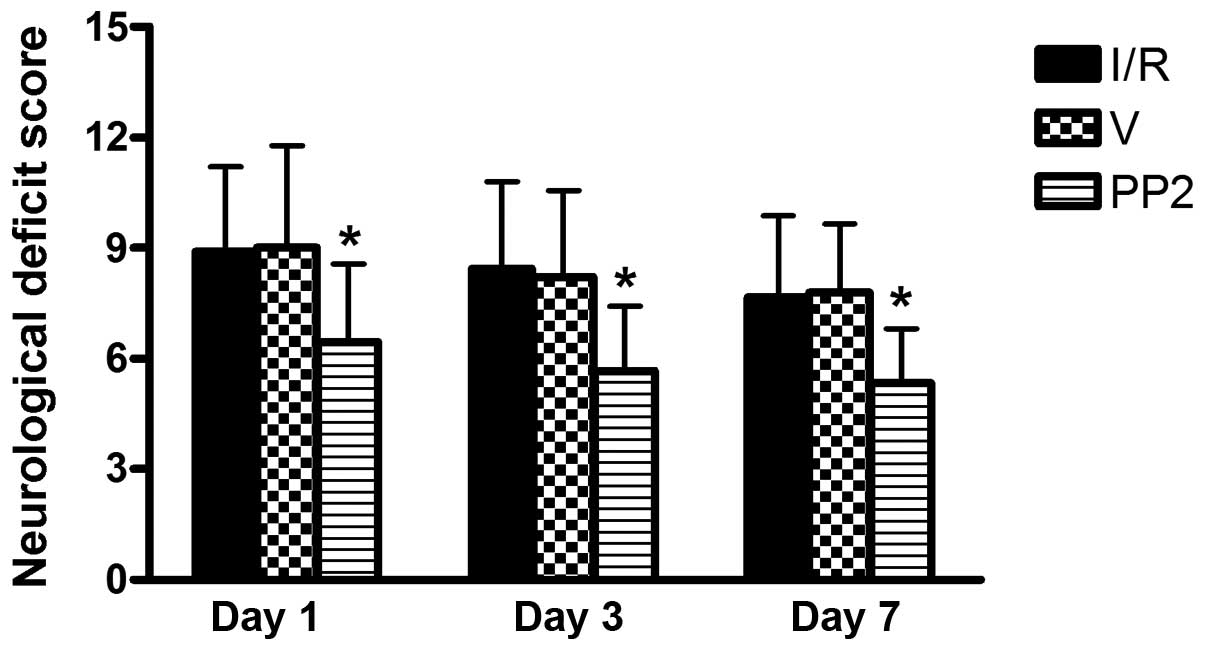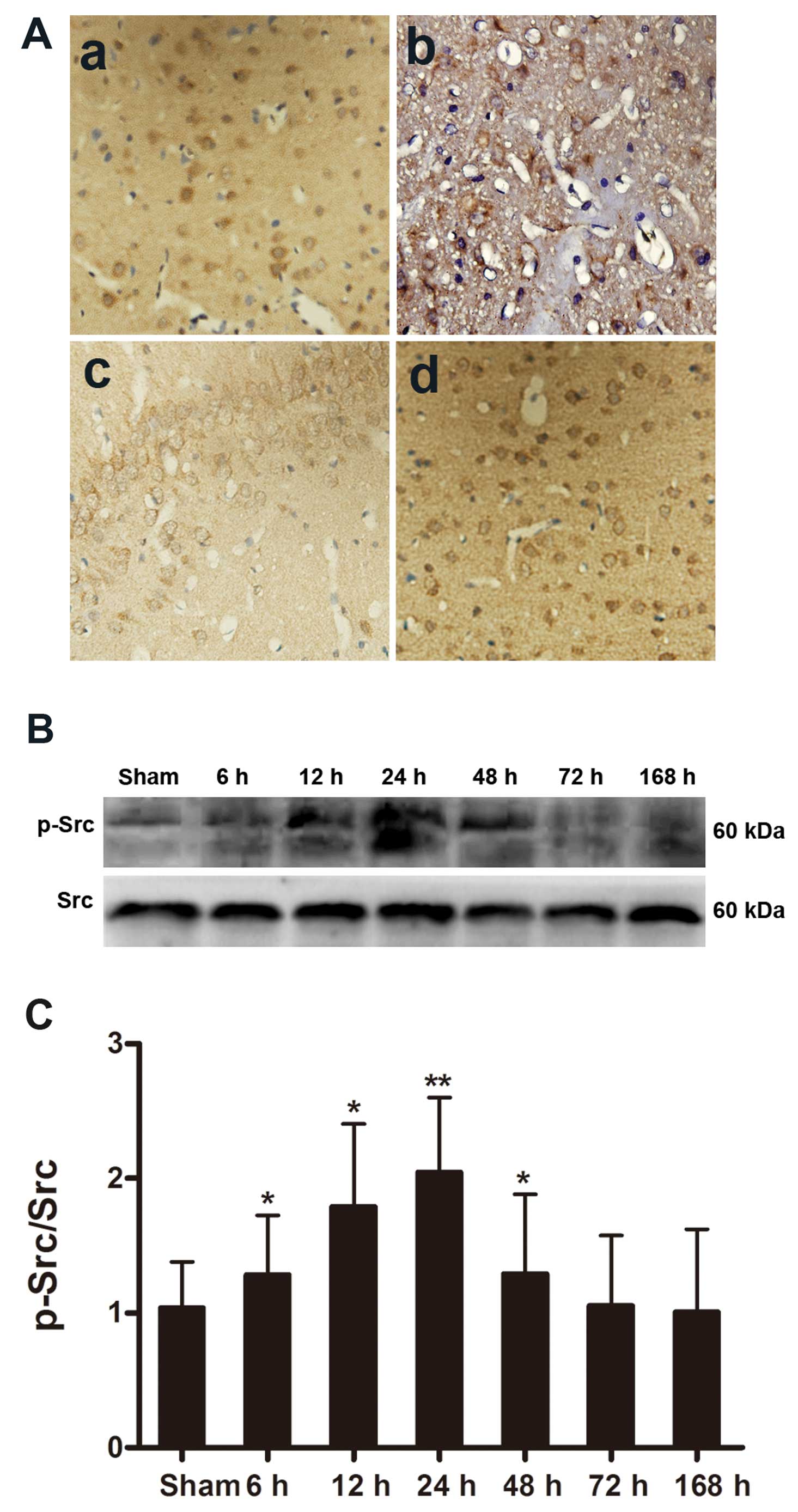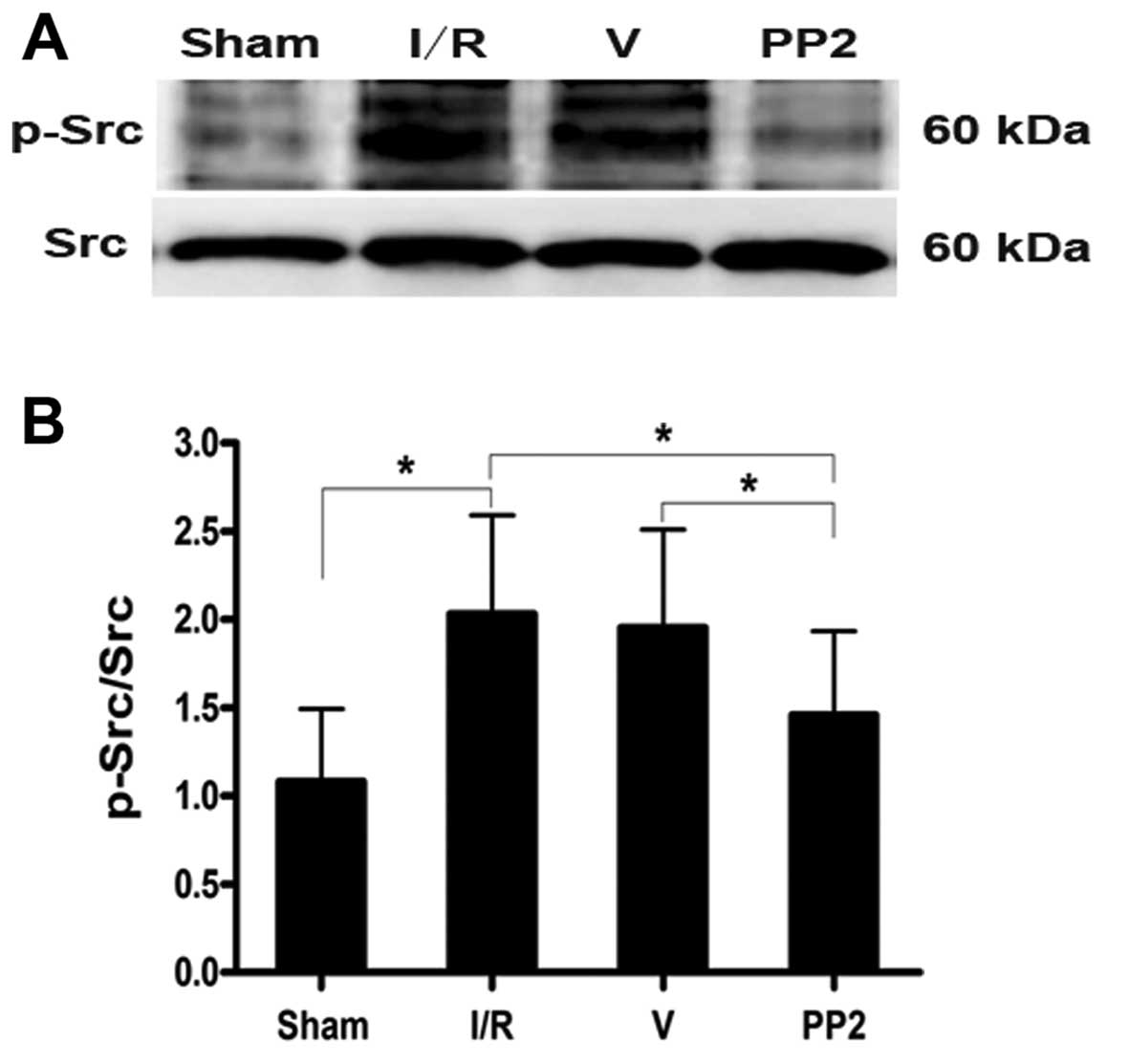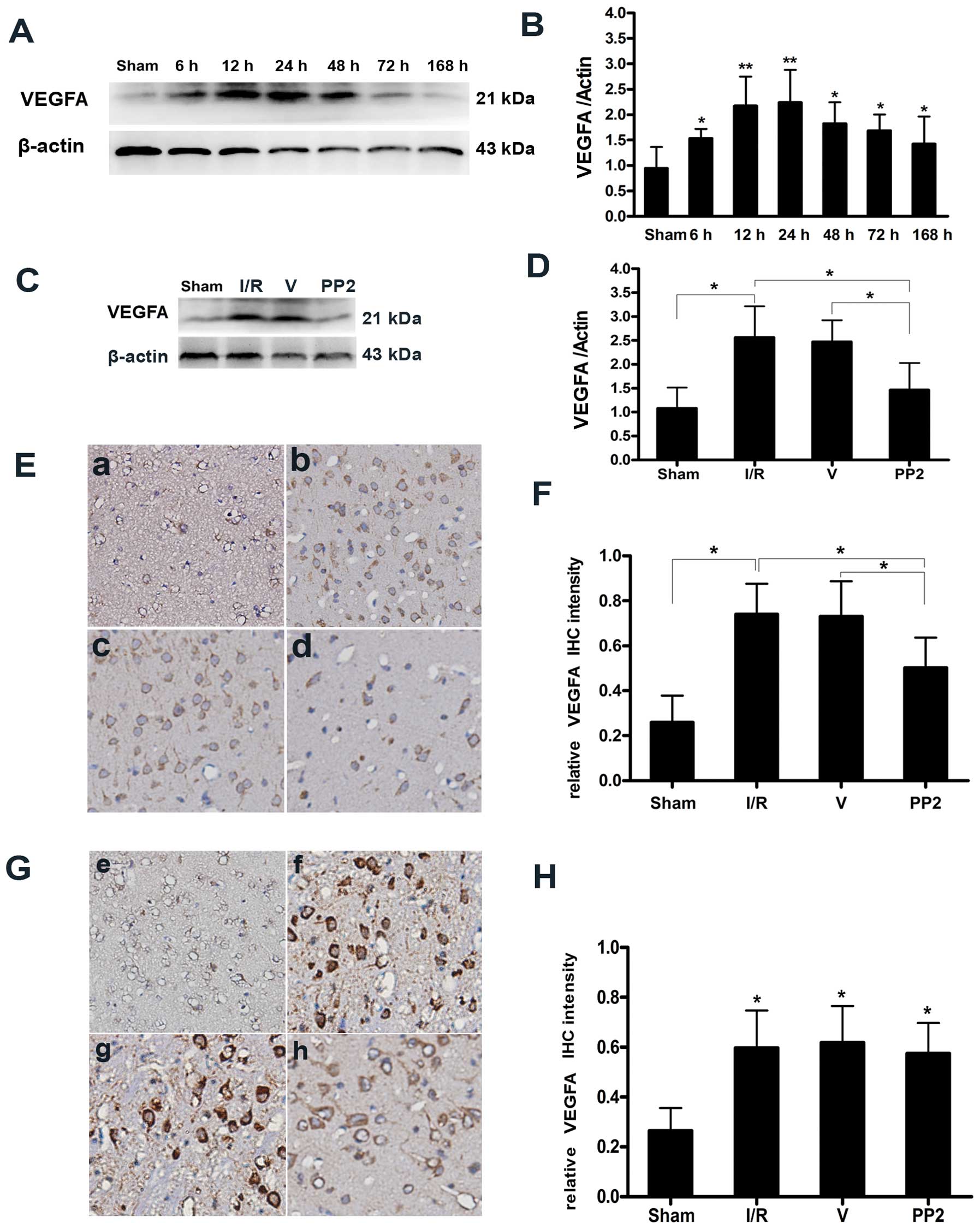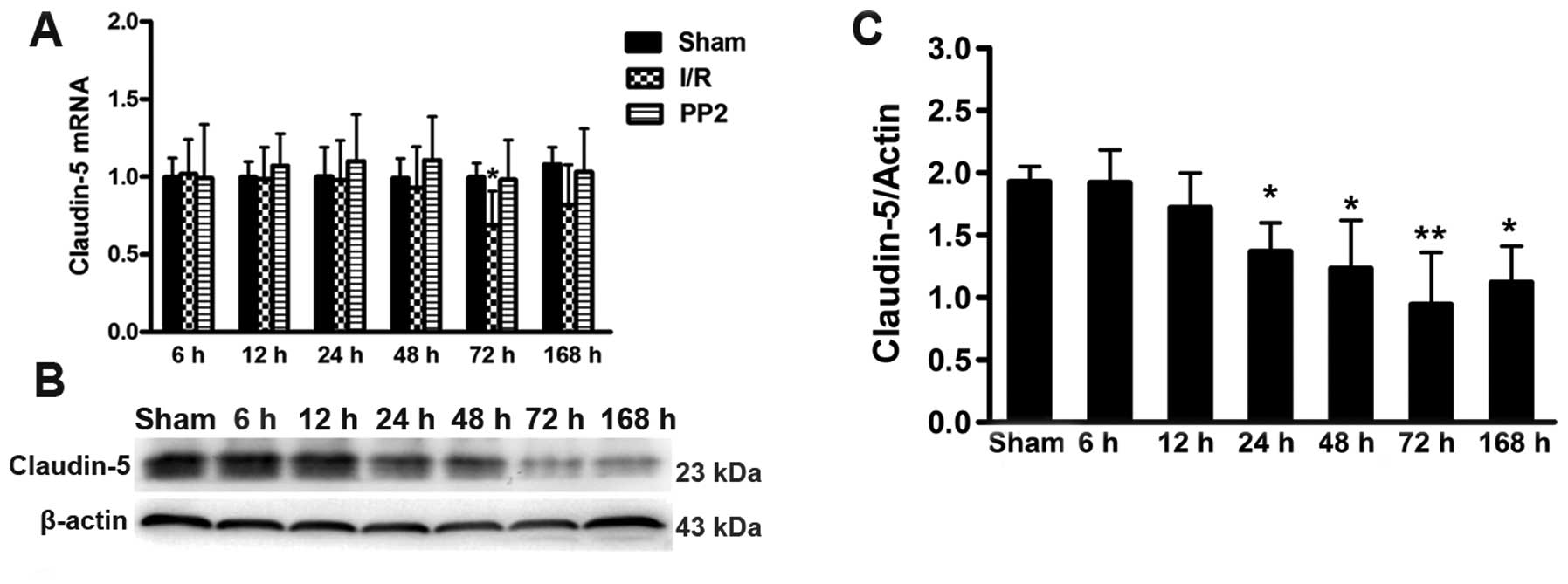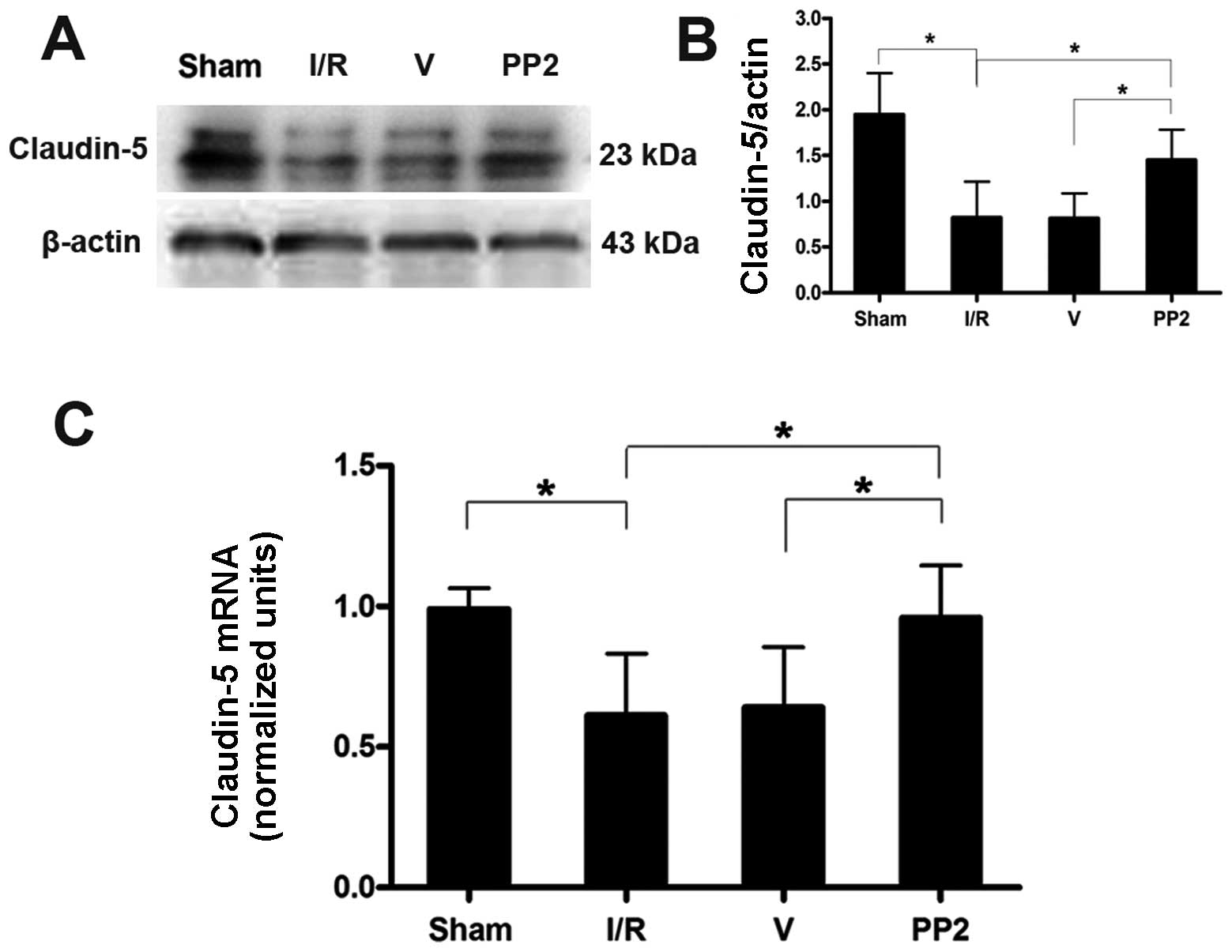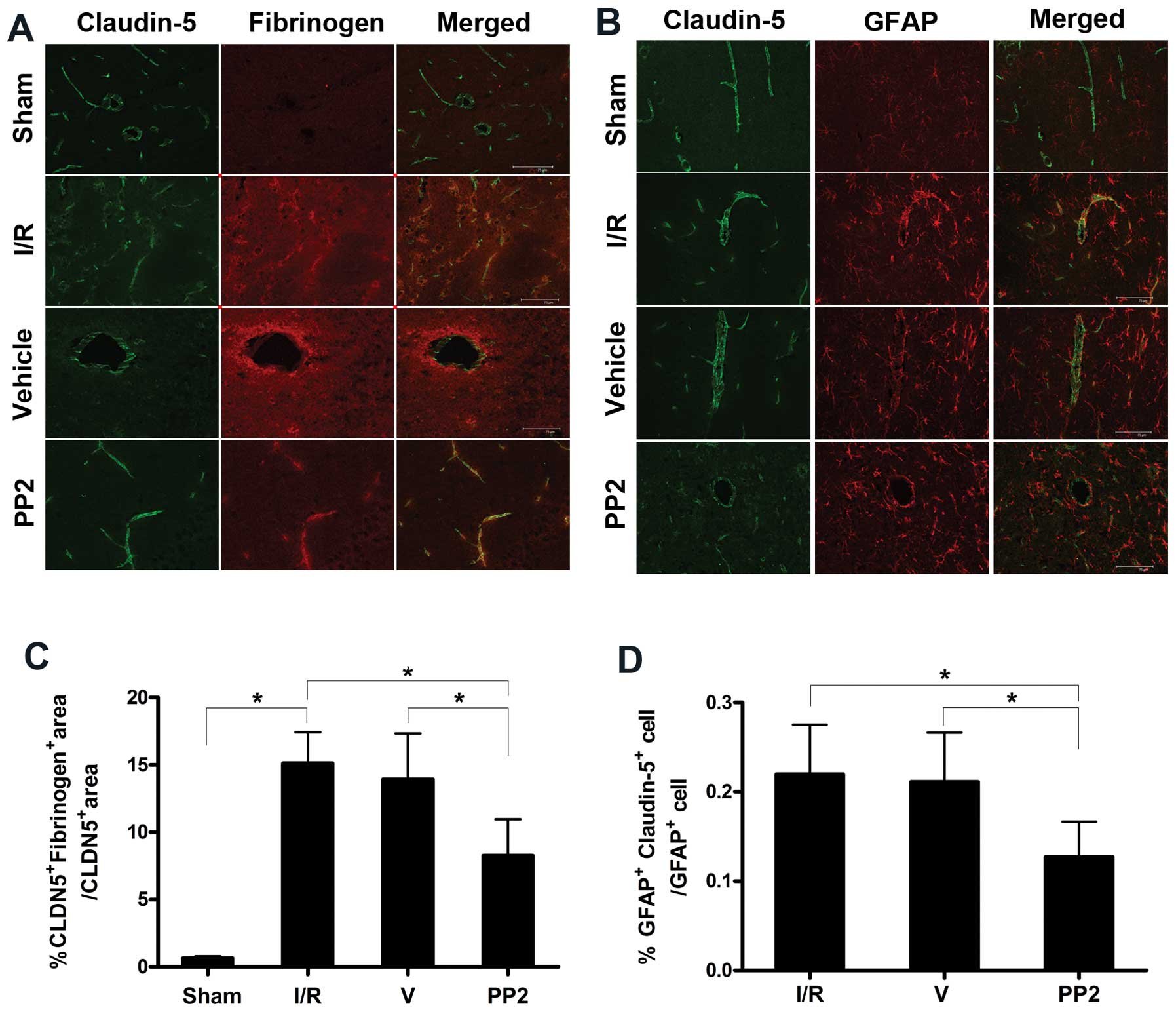|
1
|
Ayata C and Ropper AH: Ischaemic brain
oedema. J Clin Neurosci. 9:113–124. 2002. View Article : Google Scholar
|
|
2
|
Hatashita S and Hoff JT: Role of
blood-brain barrier permeability in focal ischemic brain edema. Adv
Neurol. 52:327–333. 1990.PubMed/NCBI
|
|
3
|
Ames A III, Wright RL, Kowada M, Thurston
JM and Majno G: Cerebral ischemia. II. The no-reflow phenomenon. Am
J Pathol. 52:437–453. 1968.PubMed/NCBI
|
|
4
|
Dvorak HF, Brown LF, Detmar M and Dvorak
AM: Vascular permeability factor/vascular endothelial growth
factor, microvascular hyperpermeability, and angiogenesis. Am J
Pathol. 146:1029–1039. 1995.PubMed/NCBI
|
|
5
|
Dobrogowska DH, Lossinsky AS, Tarnawski M
and Vorbrodt AW: Increased blood-brain barrier permeability and
endothelial abnormalities induced by vascular endothelial growth
factor. J Neurocytol. 27:163–173. 1998. View Article : Google Scholar : PubMed/NCBI
|
|
6
|
Kovács Z, Ikezaki K, Samoto K, Inamura T
and Fukui M: VEGF and flt. Expression time kinetics in rat brain
infarct. Stroke. 27:1865–1873. 1996.PubMed/NCBI
|
|
7
|
Hayashi T, Abe K, Suzuki H and Itoyama Y:
Rapid induction of vascular endothelial growth factor gene
expression after transient middle cerebral artery occlusion in
rats. Stroke. 28:2039–2044. 1997. View Article : Google Scholar : PubMed/NCBI
|
|
8
|
Lennmyr F, Ata KA, Funa K, Olsson Y and
Terént A: Expression of vascular endothelial growth factor (VEGF)
and its receptors (Flt-1 and Flk-1) following permanent and
transient occlusion of the middle cerebral artery in the rat. J
Neuropathol Exp Neurol. 57:874–882. 1998. View Article : Google Scholar : PubMed/NCBI
|
|
9
|
Zhang ZG, Zhang L, Tsang W, et al:
Correlation of VEGF and angiopoietin expression with disruption of
blood-brain barrier and angiogenesis after focal cerebral ischemia.
J Cereb Blood Flow Metab. 22:379–392. 2002. View Article : Google Scholar : PubMed/NCBI
|
|
10
|
Zhang ZG, Zhang L, Jiang Q, et al: VEGF
enhances angiogenesis and promotes blood-brain barrier leakage in
the ischemic brain. J Clin Invest. 106:829–838. 2000. View Article : Google Scholar : PubMed/NCBI
|
|
11
|
Levy DE and Darnell J: Stats:
transcriptional control and biological impact. Nat Rev Mol Cell
Biol. 3:829–838. 2002.
|
|
12
|
Turkson J: STAT proteins as novel targets
for cancer drug discovery. Exp Opin Ther Targets. 8:409–422. 2004.
View Article : Google Scholar : PubMed/NCBI
|
|
13
|
Paul R, Zhang ZG, Eliceiri BP, et al: Src
deficiency or blockade of Src activity in mice provides cerebral
protection following stroke. Nat Med. 7:222–227. 2001. View Article : Google Scholar : PubMed/NCBI
|
|
14
|
Niu G, Wright KL, Huang M, et al:
Constitutive Stat3 activity up-regulates VEGF expression and tumor
angiogenesis. Oncogene. 21:2000–2008. 2002. View Article : Google Scholar : PubMed/NCBI
|
|
15
|
Anderson JM: Molecular structure of tight
junctions and their role in epithelial transport. News Physiol Sci.
16:126–130. 2001.PubMed/NCBI
|
|
16
|
Argaw AT, Gurfein BT, Zhang Y, Zameer A
and John GR: VEGF-mediated disruption of endothelial CLN-5 promotes
blood-brain barrier breakdown. Proc Natl Acad Sci USA.
106:1977–1982. 2009. View Article : Google Scholar : PubMed/NCBI
|
|
17
|
Longa EZ, Weinstein PR, Carlson S and
Cummins R: Reversible middle cerebral artery occlusion without
craniectomy in rats. Stroke. 20:84–91. 1989. View Article : Google Scholar : PubMed/NCBI
|
|
18
|
Liu DZ, Ander BP, Xu H, et al: Blood-brain
barrier breakdown and repair by Src after thrombin-induced injury.
Ann Neurol. 67:526–533. 2010. View Article : Google Scholar : PubMed/NCBI
|
|
19
|
Chen J, Li Y, Wang L, et al: Therapeutic
benefit of intravenous administration of bone marrow stromal cells
(MSCs) after cerebral ischemia in rats. Stroke. 32:1005–1011. 2001.
View Article : Google Scholar : PubMed/NCBI
|
|
20
|
Campbell M, Hanrahan F, Gobbo OL, et al:
Targeted suppression of claudin-5 decreases cerebral oedema and
improves cognitive outcome following traumatic brain injury. Nat
Commun. 3:8492012. View Article : Google Scholar : PubMed/NCBI
|
|
21
|
Zlokovic BV: The blood-brain barrier in
health and chronic neurodegenerative disorders. Neuron. 57:178–201.
2008. View Article : Google Scholar : PubMed/NCBI
|
|
22
|
Rosenberg GA and Yang Y: Vasogenic edema
due to tight junction disruption by matrix metalloproteinases in
cerebral ischemia. Neurosurg Focus. 22:E42007. View Article : Google Scholar : PubMed/NCBI
|
|
23
|
Shichita T, Sugiyama Y, Ooboshi H, et al:
Pivotal role of cerebral interleukin-17-producing gammadeltaT cells
in the delayed phase of ischemic brain injury. Nat Med. 15:946–950.
2009. View
Article : Google Scholar : PubMed/NCBI
|
|
24
|
Johnson FM, Saigal B, Talpaz M and Donato
NJ: Dasatinib (BMS-354825) tyrosine kinase inhibitor suppresses
invasion and induces cell cycle arrest and apoptosis of head and
neck squamous cell carcinoma and non-small cell lung cancer cells.
Clin Cancer Res. 11:6924–6932. 2005. View Article : Google Scholar : PubMed/NCBI
|
|
25
|
Desai CJ, Sun Q and Zinn K: Tyrosine
phosphorylation and axon guidance: of mice and flies. Curr Opin
Neurobiol. 7:70–74. 1997. View Article : Google Scholar : PubMed/NCBI
|
|
26
|
Lennmyr F, Ericsson A, Gerwins P, Akterin
S, Ahlström H and Terént A: Src family kinase-inhibitor PP2 reduces
focal ischemic brain injury. Acta Neurol Scand. 110:175–179. 2004.
View Article : Google Scholar : PubMed/NCBI
|
|
27
|
Takenaga Y, Takagi N, Murotomi K, Tanonaka
K and Takeo S: Inhibition of Src activity decreases tyrosine
phosphorylation of occludin in brain capillaries and attenuates
increase in permeability of the blood-brain barrier after transient
focal cerebral ischemia. J Cereb Blood Flow Metab. 29:1099–1108.
2009. View Article : Google Scholar
|
|
28
|
Korematsu K, Goto S, Nagahiro S and Ushio
Y: Microglial response to transient focal cerebral ischemia: an
immunocytochemical study on the rat cerebral cortex using
anti-phosphotyrosine antibody. J Cereb Blood Flow Metab.
14:825–830. 1994. View Article : Google Scholar : PubMed/NCBI
|
|
29
|
Okutani D, Lodyga M, Han B and Liu M: Src
protein tyrosine kinase family and acute inflammatory responses. Am
J Physiol Lung Cell Mol Physiol. 291:L129–L141. 2006. View Article : Google Scholar : PubMed/NCBI
|
|
30
|
Mukhopadhyay D, Tsokias L, Zhou X, Foster
D, Brugge J and Sukhatme V: Hypoxic induction of human vascular
endothelial growth factor expression through c-Src activation.
Nature. 375:577–581. 1995. View
Article : Google Scholar : PubMed/NCBI
|
|
31
|
Bjorge JD, Jakymiw A and Fujita DJ:
Selected glimpses into the activation and function of Src kinase.
Oncogene. 19:5620–5635. 2000. View Article : Google Scholar : PubMed/NCBI
|
|
32
|
Zan L, Zhang X, Xi Y, Wu H, Song Y, Teng
G, Li H, Qi J and Wang J: Src regulates angiogenic factors and
vascular permeability after focal cerebral ischemia-reperfusion.
Neuroscience. 262:118–128. 2014. View Article : Google Scholar : PubMed/NCBI
|
|
33
|
Morita K, Sasaki H, Furuse M and Tsukita
S: Endothelial claudin: claudin-5/TMVCF constitutes tight junction
strands in endothelial cells. Journal Cell Biol. 147:185–194. 1999.
View Article : Google Scholar : PubMed/NCBI
|
|
34
|
Huang ZG, Xue D, Karbalai H, et al:
Biphasic opening of the blood-brain barrier following transient
focal ischemia: effects of hypothermia. Canad J Neurol Sci.
26:298–304. 1999. View Article : Google Scholar : PubMed/NCBI
|
|
35
|
Jiao H, Wang Z, Liu Y, Wang P and Xue Y:
Specific role of tight junction proteins claudin-5, occludin, and
ZO-1 of the blood-brain barrier in a focal cerebral ischemic
insult. J Mol Neurosci. 44:130–139. 2011. View Article : Google Scholar : PubMed/NCBI
|
|
36
|
Liu J, Jin X, Liu KJ and Liu W: Matrix
metalloproteinase-2-mediated occludin degradation and
caveolin-1-mediated claudin-5 redistribution contribute to
blood-brain barrier damage in early ischemic stroke stage. J
Neurosci. 32:3044–3057. 2012. View Article : Google Scholar
|
|
37
|
Nag S, Venugopalan R and Stewart DJ:
Increased caveolin-1 expression precedes decreased expression of
occludin and claudin-5 during blood-brain barrier breakdown. Acta
Neuropathol. 114:459–469. 2007. View Article : Google Scholar : PubMed/NCBI
|
|
38
|
Brown H, Hien T, Day N, et al: Evidence of
blood-brain barrier dysfunction in human cerebral malaria.
Neuropathol Appl Neurobiol. 25:331–340. 1999. View Article : Google Scholar : PubMed/NCBI
|
|
39
|
Kirk J, Plumb J, Mirakhur M and McQuaid S:
Tight junctional abnormality in multiple sclerosis white matter
affects all calibres of vessel and is associated with blood-brain
barrier leakage and active demyelination. J Pathol. 201:319–327.
2003. View Article : Google Scholar : PubMed/NCBI
|
|
40
|
Tsukita S, Furuse M and Itoh M:
Multifunctional strands in tight junctions. Nat Rev Mol Cell Biol.
2:285–293. 2001. View
Article : Google Scholar : PubMed/NCBI
|
|
41
|
Lo EH, Dalkara T and Moskowitz MA:
Mechanisms, challenges and opportunities in stroke. Nat Rev
Neurosci. 4:399–415. 2003. View
Article : Google Scholar : PubMed/NCBI
|
|
42
|
Huang N, Ashrafpour H, Levine RH, Forrest
CR, Neligan PC, Lipa JE and Pang CY: Vasorelaxation effect and
mechanism of action of vascular endothelial growth factor-165 in
isolated perfused human skin flaps. J Surg Res. 172:177–186. 2012.
View Article : Google Scholar : PubMed/NCBI
|
|
43
|
Nitta T, Hata M, Gotoh S, et al:
Size-selective loosening of the blood-brain barrier in
claudin-5-deficient mice. J Cell Biol. 161:653–660. 2003.
View Article : Google Scholar : PubMed/NCBI
|
|
44
|
Saitou M, Furuse M, Sasaki H, Schulzke JD,
Fromm M, Takano H, Noda T and Tsukita S: Complex phenotype of mice
lacking occludin, a component of tight junction strands. Mol Biol
Cell. 11:4131–4142. 2000. View Article : Google Scholar : PubMed/NCBI
|















